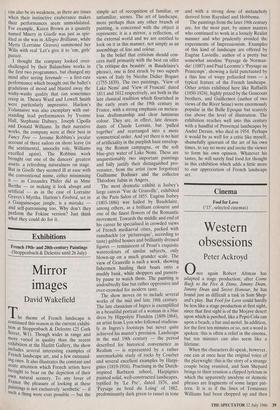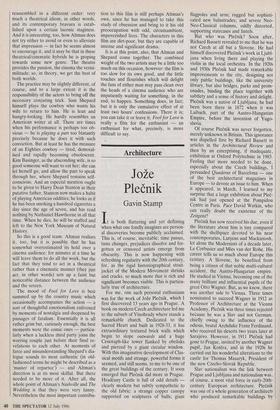Cinema
Fool for Love ('15', selected cinemas)
Western obsessions
Peter Ackroyd
0 nce again Robert Altman has adapted a stage production; after Come Back to the Five & Dime, Jimmy Dean, Jimmy Dean and Secret Honour, he has found just as difficult a task in Sam Shep- ard's play. But Fool for Love could hardly be less like a stage production at first sight, since that first sight is of the Mojave desert upon which is perched, like a Pepsi-Cola can upon a beach, a bar and motel. In addition, for the first ten minutes or so, not a word is spoken: this is often a relief in the cinema, but ten minutes can also seem like a lifetime.
When the characters do speak, however, one can at once hear the original voice of the playwright: this is the story of a strange couple being reunited, and Sam Shepard brings to their reunion a clipped lyricism in which the apparently anodyne or demotic phrases are fragments of some larger pat- tern. It is as if the lines of Tennessee Williams had been chopped up and then reassembled in a different order: very much a theatrical idiom, in other words, and its contemporary bravura is estab- lished upon a certain laconic staginess.
And it is interesting, too, how Altman does not try either to avoid or even to alleviate that impression — in fact he seems almost to encourage it, and it may be that in these theatrical/cinematic hybrids he is groping towards some new genre. The theatre provides the passion, the cinema the verisi- , militude; so, in theory, we get the best of both worlds.
The practice may be slightly different, of course, and to a large extent it is the responsibility of the actors to bring off the necessary conjuring trick. Sam Shepard himself plays the cowboy who wants his wife to return to him. He is lean and hungry-looking. He hardly resembles an American writer at all. There are times when his performance is perhaps too ob- vious — he is playing a part too blatantly precisely because he does it with such conviction. But at least he has the measure of an Eighties cowboy — tired, demoral- ised and rapidly becoming obsolescent.
Kim Basinger, as the absconding wife, is so good someone will want to eat her; she can let herself go, and allow the part to speak through her, where Shepard remains self- conscious. And an especial mention ought to be given to Harry Dean Stanton as their putative father. Stanton now makes a habit of playing American oddities; he looks as if he has been smoking a hundred cigarettes a day since the age of seven, and has read nothing by Nathaniel Hawthorne in all that time. When he dies, he will be stuffed and left to the New York Museum of Natural History.
So this is a good team. Altman realises it, too, but it is possible that he has somewhat overestimated its hold over a cinema audience: for minutes at a time he will leave them to do all the work, but the fact that they tend to act in a theatrical rather than a cinematic manner (they just act, in other words) sets up a faint but noticeable distance between the audience and the screen.
The mood of Fool for Love is best summed up by the country music which occasionally accompanies the action — a sort of thoughtful emotionalism enlivened by moments of nostalgia and deepened by passages of fatalism. Essentially it is all rather grim but, curiously enough, the best moments were the comic ones — particu- larly when a luckless third party joins the warring couple just before their final re- velations to each other. At moments of farce and misunderstanding Shepard's dia- logue sounds its most authentic (in old- fashioned terms he might be described as a `master of repartee') — and Altman's direction is at its most skilful. But there needed to be more of it. After all, the whole point of Altman's Nashville and The Wedding is that they were very funny. Nevertheless the most important contribu- tion to this film is still perhaps Altman's own, since he has managed to take this study of obsession and bring to it his old preoccupation with odd, circumambient, impoverished lives. The characters in this film are dirt-poor, but they are capable of intense and significant drama.
It is at this point, also, that Altman and Shepard come together. The combined weight of the two artists may be a little too much on this occasion, however: the film is too slow for its own good, and the little touches and flourishes which will delight the fans of either man may pass clean over the heads of a cinema audience who are impatiently waiting for something, in the end, to happen. Something does, in fact; but it is only the cumulative effect of at least two hours' confessions. There it is; you can take it or leave it. Fool for Love is really a film for the enthusiast — an enthusiast for what, precisely, is more difficult to say.



















































 Previous page
Previous page